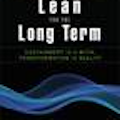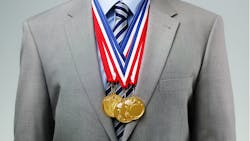Why a Lean Transformation is Like Competing in the Olympics
We’ve all heard the success stories of companies that do well implementing Lean principles. We've also heard the overwhelming number of Lean stories of companies that are disappointed with their lean approach and results.
Many companies start out with the best of intentions and learn all the lean tools, deploy teams to many projects, identify their seven wastes and do very well for a few years. But then the passion dries up and upper executives begin to look for the next big thing.
These executives have treated Lean as a project, not a way of life.
What I would like to share with you is the real story of what it takes to successfully practice Lean over the long term. In the research of this phenomenon, I’ve seen several companies that are doing the right things and have for 20 to 25 years. From that, I've identified five questions that you can use as a checklist to see if your company is truly in a Lean Transformation or simply in a Lean project mindset. The questions are as follows:
- Does the company have strategic leadership that truly believes that Lean, based on continuous improvement and respect for people, are the cornerstones of the business model?
Strategic leadership must be present and visible to successfully initiate the lean journey transformation.
- If so, does the company document the Lean strategy in their annual reports and/or create its own branded Lean Management System?
Doing so institutionalizes the approach so that it will endure during management turnover and stabilize the culture of how people work.
- Does the company communicate the Vision, Mission, Goals and Values of the company and continually base all their daily decisions on them?
This builds trust and an appetite by the employees to participate and be passionate about the company’s approach.
- Does the company use the Lean approach in all business processes including leadership, engineering, marketing, quality and continually looking at new markets, new products and services to gain customers?
This is the continuous improvement of the business model; it determines what products and services are provided and ties to growth, opportunity and prosperity.
- Do the company and the managers show an internal respect for people by helping them advance their careers through coaching, mentoring and advancement.
This is best shown by spending time with them and helping them to define their goals, suggesting appropriate education and training and finding opportunities for them.
What the answers to these questions show is that a Lean Transformation continually guides and changes strategy to meet the continually changing markets, customers and technology in the 21st century. Those who adapt to this environment the fastest will be the winners!
So how is this like competing in the Olympics?
A company operates much like a relay team in the Olympic sprints. It takes training, ability, determination, sometimes luck and, above all, the ability focus on the goal so you can beat the competition—same as our companies. Each person is selected for their position on the team based on their skill at that position. They must train intensively, depend on other team members, and ensure a smooth handoff between each leg of the race.
Guess what, normally, the fastest team that doesn't drop the baton wins the gold.
The Lean journey is a race with no finish line; however, it’s the continual transformation to stay ahead of the competition. Sometimes the race itself changes and we must be aware when it does. We just don’t need buggy whips anymore, but we do need 3D printing!
About the Author

Bill Baker
President/Owner
Bill has been a rocket performance engineer, manufacturing engineer, finance executive and manufacturing manager at Texas Instruments, University of Texas at Dallas and Raytheon spanning 43 years.
Also he has served as a keynote speaker, workshop leader, consultant and author with expertise in Lean Enterprise, excellence criteria, benchmarking and knowledge management.He is the co-author, with Ken Rolfes, of Lean for the Long Term (Productivity Press, 2015).
